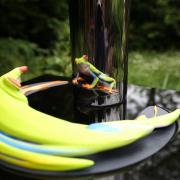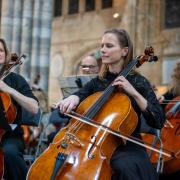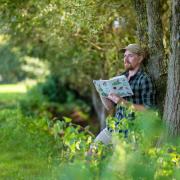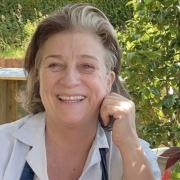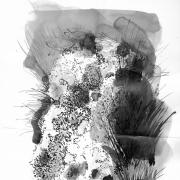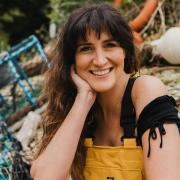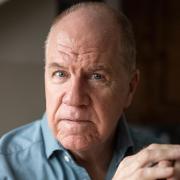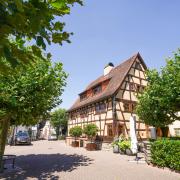Chagford’s community farm enterprise, Chagfarm arose out of two brothers’ yearning to connect farmers with local communities, writes Fran McElhone

Chagfarm is more than just an organic farm. It’s the manifestation of two brothers’ vision for a more sustainable and ethical farming model that involves the community it serves. It’s a hark back to the pre-1950s era, before industrialised farming became the norm, perpetuating a disconnect between producers and consumers.
Perched on a hilltop overlooking the village of Chagford on Dartmoor’s north westerly fringe, the farm was founded by Sylvan and Davon Friend, four-and-a-bit years ago.
Spread over 15 acres and completely off-grid, the farm has goats, chickens and pigs, and the customers live in the valley and sign-up for a set amount of produce, be it meat, dairy or eggs.
“What we’re doing here is about getting back to the land, getting back to community spirited agriculture, and creating a mutually beneficial relationship between farmer and consumer – sharing the risks and benefits,” explains Sylvan, as sunshine floods the area next to the barn, which is to become an outside kitchen with a pizza oven for community events.
“So, if our goats produce a lot, then the people get a lot, and if they don’t, they get less. People can also buy a half or quarter pig so when it’s a big one, they get more.
“And because people commit to buying a certain amount, we know what we need to produce, so nothing is wasted.”
Chagfarm is about high welfare, organic food that is accessible to local people, while making the community’s food supply more resilient.
“It’s about working off a more sustainable, low impact model and leaving the land in a better condition that when you found it, while re-energising the local economy, so you don’t have to go to Sainsbury’s or get a Waitrose delivery,” continues the 34-year-old father-of-two.
“We have a link with the primary school and we have a lot of families who come up here so children are gaining a real understanding about where their food comes from and the connection between a pig and the sausage on their plate.
“What I really want to see is an inspired next generation of young farmers, who can think outside the box and can work on a smaller scale,” he adds. “There are plenty of farms that are showing that you can make a decent profit on a smaller scale.” Including Sylvan’s brother-in-law, farmer Ed Hamer who recently featured in The Times for his organic vegetable farm initiative Chagfood on the other side of the road.
Sylvan, the farm manager, works at the farm four days. He isn’t out to profiteer, admitting that the farm doesn’t earn him much, so he supplements farm income by working as a carpenter one day a week.
When I meet him, Sylvan is mourning the recent loss of his brother Davon, who was the business manager and died suddenly at the age of 36. He and Davon were brought up on a small holding in the South Hams. The family moved to Chagford when Sylvan was 16, and then the brothers moved to Bristol, keeping bees and making honey in their garden behind Temple Meads train station.
“We had 10 hives and sold the honey to our local greengrocers who would buy everything we could give them,” Sylvan recalls. “The bees inspired us to do something more, so we got in touch with a local landowner opposite Ed’s farm and she showed us the barn, an old piggery, that hadn’t been used in about 60 years. Half the roof had caved in and there was a tree growing in there. There was probably about 15 tonnes of rubbish that needed clearing out. But we saw the potential and got really excited about it.”
This was in 2012, and fairly soon afterwards the brothers held a series of open days for the locals to find out what produce they most wanted to be available.
The two highest in demand products were organic chickens and goats’ cheese; the woodland chicken is still the most popular product.
The brothers had hoped for funding revenues, but had to turn to a Crowdfunding campaign which raised the £15,000 they needed to get going in 2014.
Six goats later and the men set about converting the farm to organic status adding chickens, bees and pigs. Four trustees are also on board providing integral support to the initiative.
With a goat dairy always the main objective, a Billy was brought in and the first kids were born about a year later. The third kidding happened this spring and they’ve been selling pork, chicken and honey for about 12 months.
“The Billy only got one goat pregnant the first year, which is unlucky, so it was slow to get off the ground. We’ve definitely been learning as we’ve gone along!”
By the second year, the dairy production, including organic raw milk, ricotta and halloumi, was up and running and the men started supplying the Chagford Inn with cheese.
The season is spring onwards, “until the days get shorter”. “We wanted to take a less intensive approach so it’s easier on the animals and ourselves,” adds Sylvan.
“We don’t need to expand any more, but we want to get more people up here. I’m just inspired by giving people the opportunity to get involved with how their food is produced.”
Chagfarm into the future
Chagfarm Community Farm is a not-for-profit, community interest organic farm that serves the local community of Chagford.
The farm, under the direction of farm manager Sylvan Friend, produces goat dairy products and meat, woodland chickens, eggs, and honey from its five hives.
The farm has its own pigs which provide chorizo, salami, paté, dry cured and air dried hams.
The enterprise also supports local butchers/farmers producing lamb, beef, venison and game and is a sibling project to organic community market garden, Chagfood.
The farm has monthly open days for the community to get involved, and hosts various courses including soft cheese making, cider making, and rural crafts such as dry stone walling and hedge laying.
There are plans to add a gaggle of geese and start a micro-brewery.
The aim is to farm the land simply, to improve carbon sequestration, soil fertility and wildlife diversity for the benefit of all.
In order to make the enterprise more sustainable and become entirely self-sufficient, the team, including four trustees, is planning on bringing all food production processes in-house such as adding a butchery.
Future plans include opening up the barn and redeveloping the workshop space and creating an outside kitchen area.
Visit chagfarm.org




